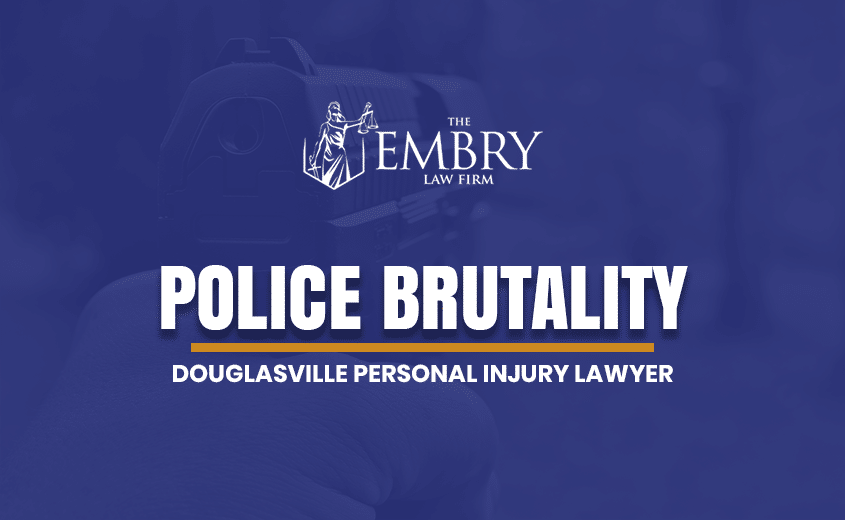
Douglasville Police Brutality Lawyer
Police officers swear an oath to serve and protect the citizens within their communities. Officers are held in high regard, and serve as examples of what is fair, legal, and appropriate. Unfortunately, sometimes police officers cross lines, use unnecessary force, or behave in a way that questions their ability to uphold the law and their position. One of the most notable examples of such violations is what is known as “police brutality”.
At The Embry Law Firm, we have seen significant changes in media and community perception of police officers and their use of force. We regularly work with clients who believe that excessive or unnecessary force was used on them, and as a result, they were injured in some way. If you believe that you are the victim of police brutality, The Embry Law Firm can help.
Understanding Police Brutality
The term “police brutality” sounds extreme, and sometimes it is. However, police brutality can occur in many different scenarios, and take on varying degrees of severity. Generally speaking, police brutality is defined as any situation where a police officer injures or kills someone through the use of excessive force, unnecessary force, or inappropriate weapon use.
At The Embry Law Firm, we represent clients in many of these situations, including:
- Excessive Force: Police officers have discretion to use force as necessary for the given situation, but they must stay within the confines of the law. Officers should only use force that is reasonably necessary for the situation. When they use excessive force while attempting to make an arrest, the result may be deemed police brutality.
- Inappropriate Taser Use: Taser guns are carried by most police officers, and are sometimes necessary to protect and preserve life. However, when a police officer uses the taser gun inappropriately or with excessive force, such as using the taser on someone who was not resisting arrest, he or she may be committing police brutality.
- Wrongful Shooting: Police officers are trained to use firearms with the utmost caution and care. Sometimes, situations involving guns result in the wrongful shooting of a suspect, bystander, or even a pet. Officers who intentionally misuse their firearm and harm someone, or who are negligent in their handling of a firearm, may be guilty of police brutality. These officers may also be held liable for damages caused to the victims.
- Malicious Prosecution: Police officers who are conducting a search and seizure must have probable cause, and often, must have a warrant. If the officer does not have reasonable suspicion that a crime has occurred, or has not obtained a warrant, then he or she could be found guilty of conducting an unreasonable search or seizure, which is highly inappropriate. These situations also cause incredible difficulties in the courtroom.
- Emotional Distress: Police officers should never intentionally cause emotional harm to another person. If a police officer intentionally causes emotional distress in an effort to elicit information or force a suspect to surrender, he or she may be guilty of police brutality.
- Failure to Intervene: If a police officer witnesses a violation of someone’s constitutional rights but fails to intervene, he or she may be considered negligent. This may include situations where one officer witnesses another officer using excessive force or otherwise acting outside his or her position, but does nothing to intervene.
Police officers have a great deal of responsibility, and a great deal of discretion. As citizens, we trust that law enforcement officers will abide by their duties in protecting our safety and our legal rights. When officers overstep their boundaries and cause more harm than good, the result is devastating for everyone involved.
How a Douglasville Police Brutality Lawyer Can Help You
Police brutality is a serious matter. At The Embry Law Firm, we know how important your constitutional and civil rights are, and our goal is to ensure that they have not been violated by the very people charged with upholding and protecting them. Our Douglasville police brutality lawyer can help you understand your legal rights and determine if you have a police brutality case.
It is important to remember that not all uncomfortable or unfortunate interactions between citizens and police will constitute police brutality. Before coming to any conclusions about your situation, you need a skilled lawyer to examine your case and get all the facts. You also need to work with a lawyer who is familiar with the legal rights and responsibilities of police officers.
Police officers are entitled to what is known as a “qualified immunity defense”, meaning that you must be able to prove that the officer violated federal law, or your constitutional or civil rights. It can seem like a fruitless and uphill battle to prove that police brutality occurred, but it can be done with the right legal help.
Contact The Embry Law Firm Today
At The Embry Law Firm, our personal injury lawyers can help you make sense of your situation, and will work hard to make sure your case is handled appropriately. We will examine every aspect of your situation to determine the best course of action. If your case does qualify as police brutality, then we will prepare to pursue the justice and compensation you deserve.
To speak with our team or schedule a free consultation, call our office at 844-443-6279. You can also fill out our online form to get started, and our staff will contact you as soon as possible.
